5 November 2021, 9.30pm–12.30pm
Faculty of Arts, Charles University in Prague
náměstí Jana Palacha 2, Prague 1
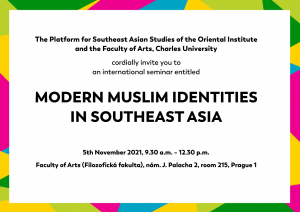 Islam is the religion with the largest number of believers in Southeast Asia, where Muslims make up 42 percent of the population. Their majority populations live in Indonesia, Malaysia and Brunei, but significant minorities can also be found in southern Thailand, the southern Philippines and other countries in the region. As a religion, Islam is characterized by enormous dynamism and influence on the culture, politics and overall character of local societies. The interaction of Muslim traditions with modernity, the connection of Islam with the political establishment, or the daily challenges of Muslims in a globalizing world will all be the topics of the international seminar Modern Muslim Identities in Southeast Asia, with presentations of anthropologists and orientalists from the Netherlands, Germany, Austria and Hungary. The event is co-organized by the Platform for the Study of Southeast Asia of the Oriental Institute of the CAS and the Institute of Asian Studies of the Faculty of Arts, Charles University, within the project Strategy AV21 Global Conflicts and Local Interactions.
Islam is the religion with the largest number of believers in Southeast Asia, where Muslims make up 42 percent of the population. Their majority populations live in Indonesia, Malaysia and Brunei, but significant minorities can also be found in southern Thailand, the southern Philippines and other countries in the region. As a religion, Islam is characterized by enormous dynamism and influence on the culture, politics and overall character of local societies. The interaction of Muslim traditions with modernity, the connection of Islam with the political establishment, or the daily challenges of Muslims in a globalizing world will all be the topics of the international seminar Modern Muslim Identities in Southeast Asia, with presentations of anthropologists and orientalists from the Netherlands, Germany, Austria and Hungary. The event is co-organized by the Platform for the Study of Southeast Asia of the Oriental Institute of the CAS and the Institute of Asian Studies of the Faculty of Arts, Charles University, within the project Strategy AV21 Global Conflicts and Local Interactions.
Programme (PDF)
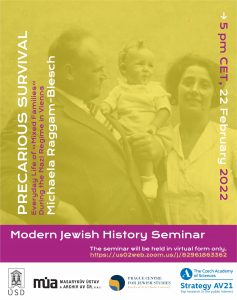 Institute for Contemporary History CAS, Masaryk Institute and Archives of the CAS and Prague Centre for Jewish Studies invite you to the seminar Precarious Survival: Everyday Life of “Mixed Families” During the Nazi Regime in Vienna with Michaela Raggam-Blesch (Vienna University).
Institute for Contemporary History CAS, Masaryk Institute and Archives of the CAS and Prague Centre for Jewish Studies invite you to the seminar Precarious Survival: Everyday Life of “Mixed Families” During the Nazi Regime in Vienna with Michaela Raggam-Blesch (Vienna University).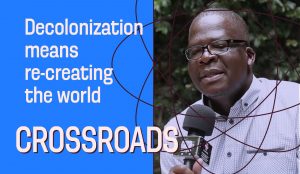 The podcast Na rozcestí / Crossroad invites Sabelo J. Ndlovu-Gatsheni who is currently one of the leading scholars in Decolonial Studies. He is Professor and Chair of Epistemologies of the Global South with a focus on Africa at the University of Bayreuth in Germany. Originally trained as a Historian in Zimbabwe he held various prestigious research positions and directorships at universities in South Africa. In this podcast he is speaking about the unfinished process of Decolonization, what is meant by the concepts of epistemic violence and of coloniality of power. He explains that it is important to question how and from where we acquire knowledge and how this is linked to our identities and also, how we can better grapple with the contested social construct of ‘race’.
The podcast Na rozcestí / Crossroad invites Sabelo J. Ndlovu-Gatsheni who is currently one of the leading scholars in Decolonial Studies. He is Professor and Chair of Epistemologies of the Global South with a focus on Africa at the University of Bayreuth in Germany. Originally trained as a Historian in Zimbabwe he held various prestigious research positions and directorships at universities in South Africa. In this podcast he is speaking about the unfinished process of Decolonization, what is meant by the concepts of epistemic violence and of coloniality of power. He explains that it is important to question how and from where we acquire knowledge and how this is linked to our identities and also, how we can better grapple with the contested social construct of ‘race’.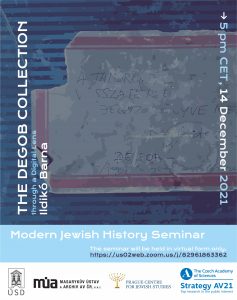 Masaryk Institute and Archives of the CAS and Prague Centre for Jewish Studies invite you to the seminar The DEGOB Collection through a Digital Lens with Ildikó Barna (Eötvös Loránd University).
Masaryk Institute and Archives of the CAS and Prague Centre for Jewish Studies invite you to the seminar The DEGOB Collection through a Digital Lens with Ildikó Barna (Eötvös Loránd University). The Institute of Sociology of the Czech Academy of Sciences and Faculty of Humanities, Charles University in Prague, in collaboration with Association for Integration and Migration invite you to the international symposium Borders, Mobility of Care and Translocal Social Reproduction.
The Institute of Sociology of the Czech Academy of Sciences and Faculty of Humanities, Charles University in Prague, in collaboration with Association for Integration and Migration invite you to the international symposium Borders, Mobility of Care and Translocal Social Reproduction. Islam is the religion with the largest number of believers in Southeast Asia, where Muslims make up 42 percent of the population. Their majority populations live in Indonesia, Malaysia and Brunei, but significant minorities can also be found in southern Thailand, the southern Philippines and other countries in the region. As a religion, Islam is characterized by enormous dynamism and influence on the culture, politics and overall character of local societies. The interaction of Muslim traditions with modernity, the connection of Islam with the political establishment, or the daily challenges of Muslims in a globalizing world will all be the topics of the international seminar Modern Muslim Identities in Southeast Asia, with presentations of anthropologists and orientalists from the Netherlands, Germany, Austria and Hungary. The event is co-organized by the Platform for the Study of Southeast Asia of the Oriental Institute of the CAS and the Institute of Asian Studies of the Faculty of Arts, Charles University, within the project Strategy AV21 Global Conflicts and Local Interactions.
Islam is the religion with the largest number of believers in Southeast Asia, where Muslims make up 42 percent of the population. Their majority populations live in Indonesia, Malaysia and Brunei, but significant minorities can also be found in southern Thailand, the southern Philippines and other countries in the region. As a religion, Islam is characterized by enormous dynamism and influence on the culture, politics and overall character of local societies. The interaction of Muslim traditions with modernity, the connection of Islam with the political establishment, or the daily challenges of Muslims in a globalizing world will all be the topics of the international seminar Modern Muslim Identities in Southeast Asia, with presentations of anthropologists and orientalists from the Netherlands, Germany, Austria and Hungary. The event is co-organized by the Platform for the Study of Southeast Asia of the Oriental Institute of the CAS and the Institute of Asian Studies of the Faculty of Arts, Charles University, within the project Strategy AV21 Global Conflicts and Local Interactions.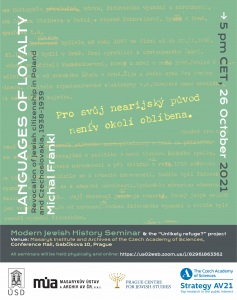 Masaryk Institute and Archives of the CAS and Prague Centre for Jewish Studies invite you to the seminar Languages of loyalty. Revocation of Jewish citizenship in Poland and Czechoslovakia, 1938–1939 with Michal Frankl (MIA CAS).
Masaryk Institute and Archives of the CAS and Prague Centre for Jewish Studies invite you to the seminar Languages of loyalty. Revocation of Jewish citizenship in Poland and Czechoslovakia, 1938–1939 with Michal Frankl (MIA CAS).
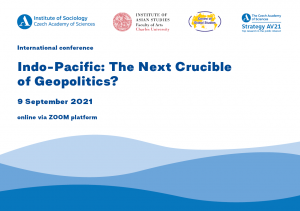 Spanning in its most extensive imagination from the eastern coast of Africa towards the western coast of the Americas, the Indo-Pacific is a geopolitical concept in the making. This conference will bring together experts from the fields of Political Science, Security Studies and South Asian Studies to look from different angles at what is increasingly becoming the crucible of geopolitics.
Spanning in its most extensive imagination from the eastern coast of Africa towards the western coast of the Americas, the Indo-Pacific is a geopolitical concept in the making. This conference will bring together experts from the fields of Political Science, Security Studies and South Asian Studies to look from different angles at what is increasingly becoming the crucible of geopolitics.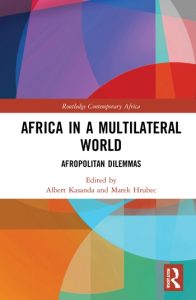 Albert Kasanda and Marek Hrubec, as the main authors and editors, has just published a book on Africa in multilateral and global interactions (London, New York:
Albert Kasanda and Marek Hrubec, as the main authors and editors, has just published a book on Africa in multilateral and global interactions (London, New York: 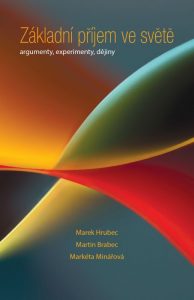 Marek Hrubec, Martin Brabec and Markéta Minářová published a book on basic income, intended for the general public (Prague:
Marek Hrubec, Martin Brabec and Markéta Minářová published a book on basic income, intended for the general public (Prague: